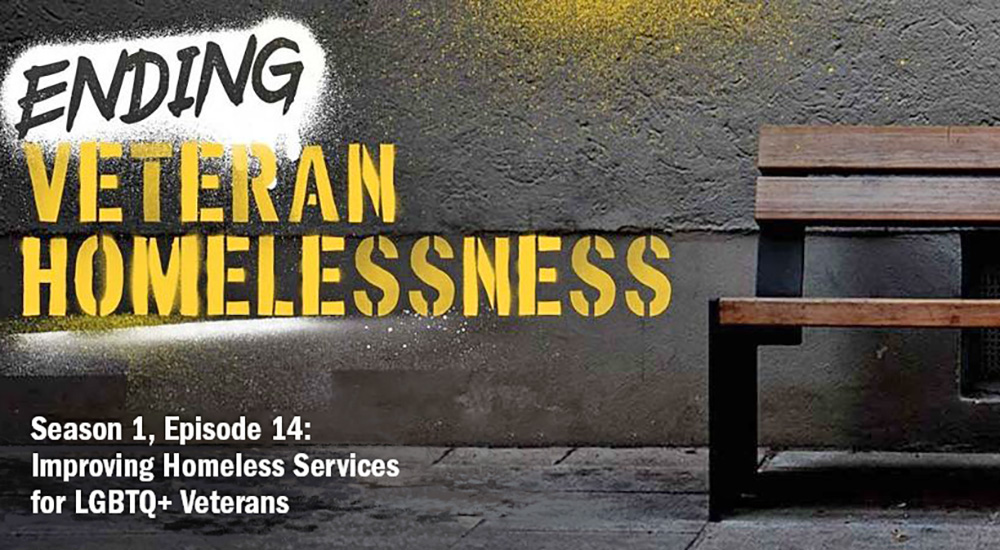Since World War I, camouflage uniforms have been used by the military to disguise and hide troops. And while every Veteran understands the honor of wearing the uniform of the United States of America, LGBTQ+ Veterans understand how it feels to be “hidden” by their uniform in more ways than one.
On episode 14 of the “Ending Veteran Homelessness” podcast, we’re joined by Dr. Jillian Shipherd, deputy director of VHA’s National LGBTQ+ Health Program, and Lindsay Church, executive director and founder of Minority Veterans of America.
We discuss the ways LGBTQ+ Veterans have been forced to conceal their true identity while serving in the military, the risk factors for homelessness that LGBTQ+ Veterans face, and what VA homeless programs are doing to make services more accessible to and effective for LBGTQ+ Veterans.
Putting their nation’s freedom first
“LGBTQ+ service members and Veterans have existed across history from the beginning of military service,” said Church. “It wasn’t until the forties and the sixties that they really started to criminalize sexual orientation within the military service.”
In World War II, gay and lesbian service members received “blue discharges” and were often criminalized for their identities.
When “Don’t Ask, Don’t Tell” was adopted in 1994, the policy was unfortunately viewed as a somewhat progressive update for LGBTQ+ service members. Lesbian, gay, and bisexual service members were permitted to serve in the military if they kept their sexual orientation a secret. If they chose to be their authentic selves, they could still be discharged.
Church recalls, “I knew full well that I was putting on this uniform and that this nation mattered more to me than my personal and individual freedoms.”
Discharges and discrimination
Though “Don’t Ask, Don’t Tell” was repealed in 2011, the long legacy of discrimination toward LGBTQ+ service members continues to impact too many Veterans today.
As the episode highlights, thousands of LGBTQ+ service members have been subject to dishonorable discharges based on their sexual orientation and historically excluded from the federal and VA benefits they deserve in the process.
Regardless of their discharge status, too many LGBTQ+ Veterans have been excluded from enjoying the very freedoms they defended. Until recently, it was legal for landlords to deny housing to and evict LGBTQ+ tenants based on their sexual identity. And the LGBTQ+ community historically has been discriminated against when it comes to hiring.
As a result of such discrimination, LGBTQ+ Veterans often experience chronic stress and stigma, higher rates of PTSD and increased rates of military sexual trauma relative to their straight and cisgender counterparts.
Tragically, those who are sexual and gender minorities are more likely than their cisgender and heterosexual peers to experience suicidal ideation and attempts.
Risk factors for homelessness
VA homeless programs now train all staff to collect data on the sexual orientation and gender identity of Veteran users. VA can better understand the needs of LGBTQ+ Veterans and ultimately improve the programs and services to better meet the needs of this population.
Some LGBTQ+ Veterans may be hesitant to re-engage with their memories of military service. These painful experiences may deter them from seeking care through VA. VA assures all Veterans that no matter who they love or how they identify, we are here for you, and we are committed to providing you with the services and care you have earned.
VA has implemented LGBTQ+ Veteran care coordinators (VCCs) at every VA facility nationwide. LGBTQ+ VCCs ensure all LGBTQ+ Veterans are receiving the care they need in an affirming and inclusive environment.
Learn about VA programs
If you are a Veteran who is homeless or at risk for homelessness, call the National Call Center for Homeless Veterans at 877-4AID-VET (877-424-3838).
Visit the VA Homeless Programs website to learn about housing initiatives and other programs for Veterans exiting homelessness.
Check out the Ending Veteran Homelessness podcast to learn more about what VA is doing about Veteran homelessness.
Learn about how to get involved with housing homeless Veterans.
For more stories like these, subscribe to the Homeless Programs Office newsletter to receive monthly updates about programs and supportive services for Veterans experiencing or at risk of homelessness.
Topics in this story
Link Disclaimer
This page includes links to other websites outside our control and jurisdiction. VA is not responsible for the privacy practices or the content of non-VA Web sites. We encourage you to review the privacy policy or terms and conditions of those sites to fully understand what information is collected and how it is used.
More Stories
The Medical Foster Home program offers Veterans an alternative to nursing homes.
Watch the Under Secretary for Health and a panel of experts discuss VA Health Connect tele-emergency care.
The 2024 National Veteran Suicide Prevention Annual Report provides the foundation for VA’s suicide prevention programs and initiatives.






